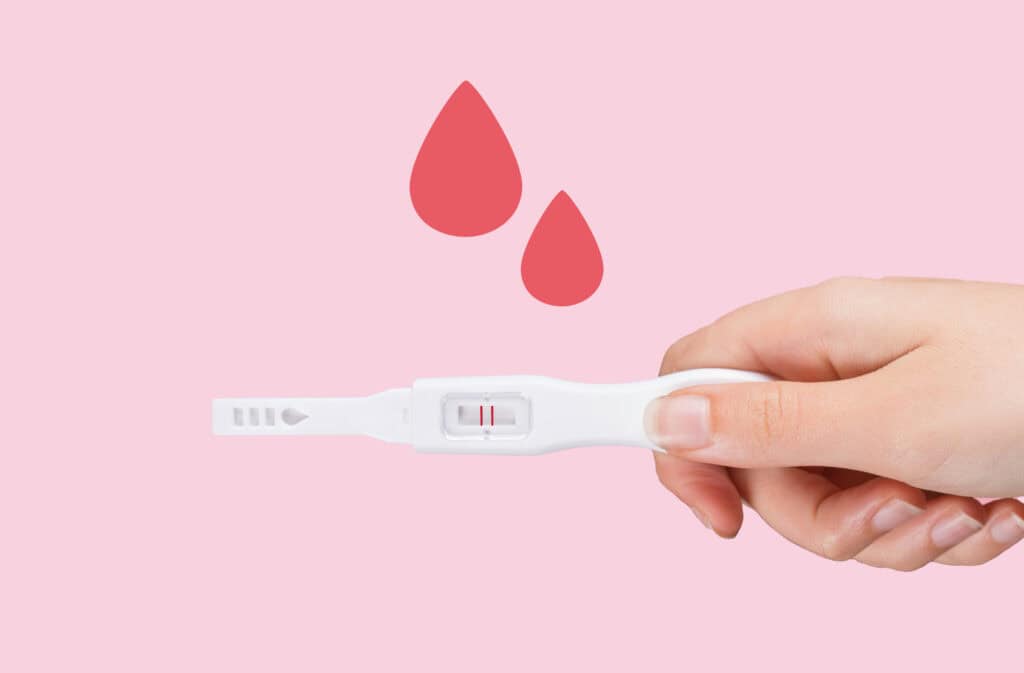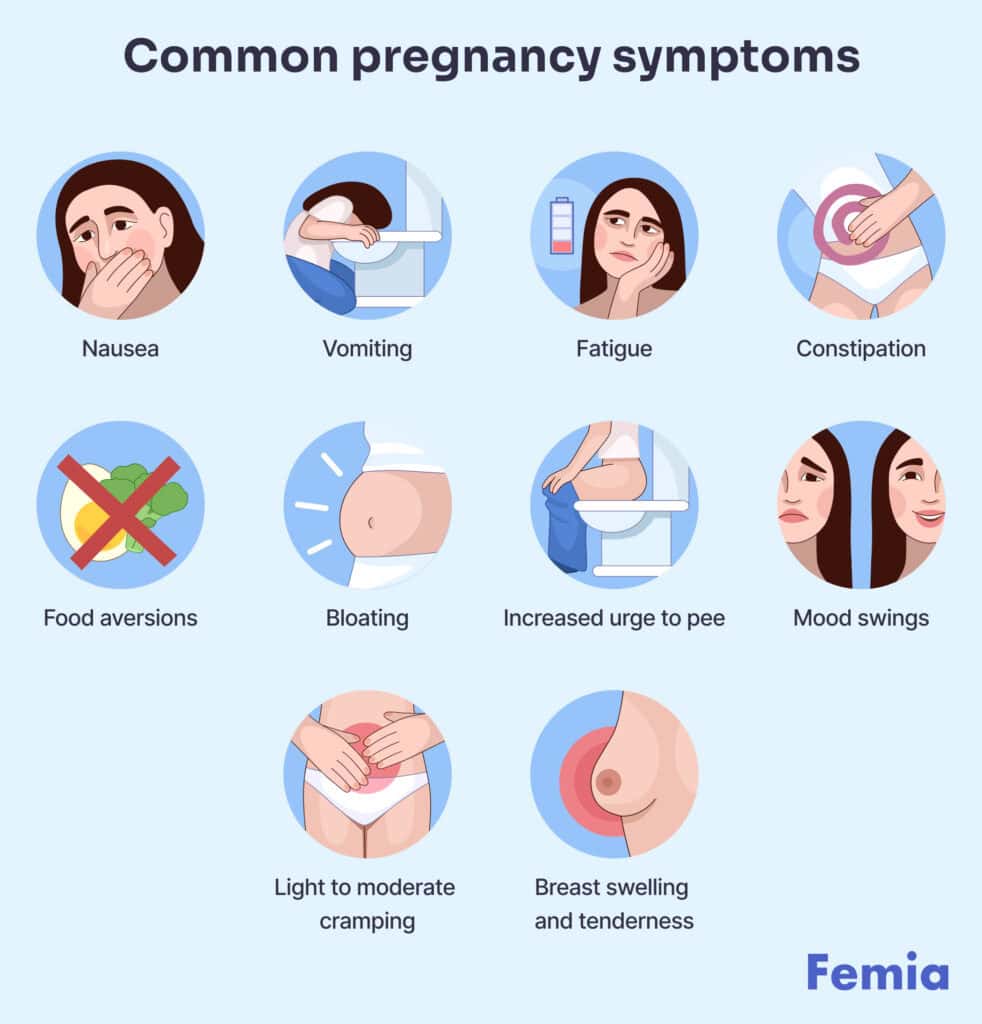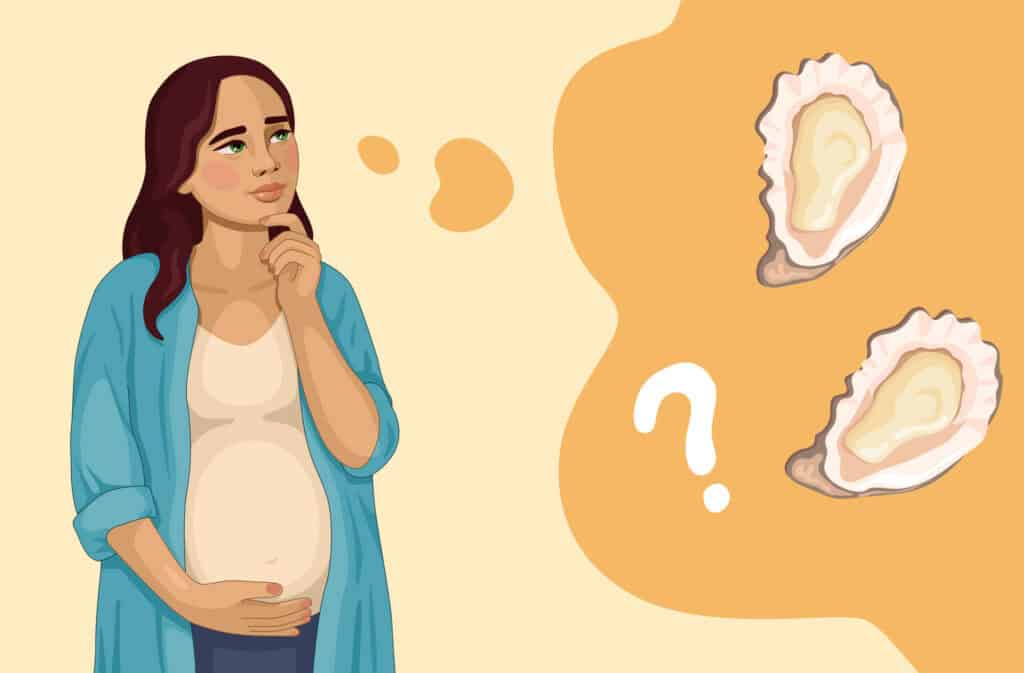Femia > Health Library > Pregnancy > Pregnancy health > Can you be pregnant and still have a period? Understanding bleeding during pregnancy
Can you be pregnant and still have a period? Understanding bleeding during pregnancy

- Updated Feb 10, 2025
- Published
CRAFTED BY HUMAN
Crafted by human At Femia, we provide accurate and up-to-date information at every stage of your journey, from trying to conceive, pregnancy and postnatal support. All content is created by a real person based on in-depth research and own professional experience. Femia ensures that you will receive expert advice, strict accuracy and a personalized approach from our authors/medical experts. Learn more about our editorial policy.
FACT CHECKED
Fact checked At Femia Health, we maintain the highest standards of editorial excellence in delivering content focused on helping you conceive, guiding you through pregnancy, and supporting you postpartum. Explore our content review principles to learn how we ensure the accuracy and quality of our health and lifestyle tips for every stage of your journey.
Can you have a period and still be pregnant? The short answer is “no.” Vaginal bleeding that takes place in early stages of pregnancy is commonly caused by:
- Egg implantation
- Hormonal shift
- Cervix changes
Unlike menstruation, normal pregnancy-related bleeding is typically lighter in flow and color and goes away in a few hours or days.
Can you have a period while pregnant? Although a missed period is one of the first early clues of a pregnancy, many women do experience vaginal bleeding after getting pregnant. Without any doubt, this can feel very confusing and alarming. However, in many cases, it’s a natural part of pregnancy development.
Bleeding during pregnancy, especially in the early stages, can be caused by a variety of factors. In this article, we’ll explain the most common causes, ways to distinguish pregnancy bleeding from menstruation, and occasions when you might need to see a doctor.
With Femia, you will get personalized insights every step of the way
Can you have a period while pregnant?
As we all know, a missed period is one of the earliest pregnancy signs. So, it can be confusing and distressing to experience bleeding when you think you’re pregnant. Yet, this isn’t an uncommon event. Studies show that as many as 20% to 30% of pregnant women have vaginal bleeding during the first 20 weeks. Sometimes, this bleeding is easy to confuse with a period, but it’s not the same.
What are the main menstrual cycle phases?
So, can you have a period and be pregnant? The answer is a firm “no.” This is easily explained if we break down the mechanics of your menstrual cycle:
- During the first half of your cycle—the follicular phase—you first have your period (approximately days 1–7) and then enter the proliferative phase (from the end of your period until ovulation). During this phase, your ovaries actively produce estrogen, preparing you for ovulation and pregnancy. This hormone causes the lining of your uterus to grow and get thicker to be able to accommodate a possible pregnancy.
- Ovulation marks about the halfway point of your cycle. During ovulation, your ovaries release a mature egg, which travels down the fallopian tube and waits to be fertilized by sperm.
- After ovulation, you enter the luteal phase of your cycle. This phase lasts until your next period. If the egg is fertilized during the fertility window, ovulation or the following 12 to 24 hours, it will travel to the uterus, where the lining is thick and ready to help an egg implant and grow. If the egg is not fertilized, your body doesn’t need that thick uterus lining and gets rid of it. The lining breaks down and you get your period as the blood, tissue, and nutrients it’s made of flow out of your body.
Since the breakdown of the uterine lining is what causes periods, it’s impossible to have them during pregnancy, when the lining remains intact. So, while you might experience bleeding, it’s never your period.
👉Find out more: Implantation bleeding vs period: How to tell the difference
What causes bleeding during pregnancy?
If you notice vaginal bleeding during your pregnancy, there are four likely reasons:
Implantation bleeding
The implantation of the fertilized egg into the uterus lining is one of the most common reasons for vaginal bleeding in pregnancy. It typically takes place around 10 to 14 days after conception (ovulation) and happens to about 1 in 4 pregnant women. So, if you experience bleeding around two weeks after ovulation and start wondering “Can I be pregnant and have a period?”, chances are that it’s just the process of implantation.
Type of discharge: Typically light-flow bleeding or spotting of pinkish or brownish color with no visible clots.
Cervical changes
When your body changes to accommodate and support pregnancy, it might change the position of your cervix, making it rise higher in the vagina. It also becomes softer and more vulnerable to damage, which may sometimes cause bleeding. This is one of the most common explanations for concerns like “I had sex then got my period, can I still be pregnant?”
Type of discharge: Typically light spotting or a bit heavier discharge of pinkish color. Often taking place after sex. If you notice any blood after sex, it’s best to consult a doctor.
Hormonal shift
If you experience bleeding a bit later, around week 6–8, it might be caused by hormonal fluctuations. Around this time, you’ll experience a luteal-placental shift, which is when the placenta has developed enough to produce pregnancy-supporting hormones. A rise in the production of these hormones can lead to a temporary drop in progesterone levels, causing light spotting or even heavy, menstruation-like bleeding.
Type of discharge: Typically light pink to brownish in color and accompanied by very minimal discharge.
Ectopic pregnancy or miscarriage
If your pregnancy ends before the 22nd week, it is defined as a miscarriage. Pregnancy loss after this point is generally classified as either preterm birth or stillbirth, depending on gestational age and fetal viability. Miscarriage can sometimes be a cause of vaginal bleeding.
Other symptoms of miscarriage to keep an eye on include:
- Disappearance of pregnancy symptoms
- Cramping and pain in the lower tummy
- A discharge of fluid or tissue
Type of discharge: Typically heavier-flow bleeding of dark red color with visible clots. Often accompanied with cramping and pain.
Another cause of bleeding might be an ectopic pregnancy—when your egg implants outside the womb. The symptoms of such pregnancy typically show around week 6–8 and include:
- Pain in the lower tummy
- Discomfort when peeing or pooping
- Pain in the tip of your shoulder
Type of discharge: Typically brown in color and watery discharge or bleeding.
Symptoms of pregnancy during periods
If you feel disturbed after facing vaginal bleeding in pregnancy, it’s natural to wonder, can you be pregnant and still have a period? As you already know, it’s impossible to menstruate during pregnancy (even in the early stages). However, as we’ve discussed, it’s possible to experience other types of bleeding that might be absolutely normal.

To tell the difference and confirm that you’re still pregnant, keep an eye on other common pregnancy symptoms, such as:
- Breast swelling and tenderness
- Nausea
- Vomiting
- Increased urge to pee
- Fatigue
- Bloating (similar to when you are on your period)
- Mood swings
- Light to moderate cramping
- Constipation
- Food aversions
@femia.fertility Absolutely! However, the chances are minimal depending on the length of your menstrual cycle and period duration. Planning your 'baby dance' during your fertile window is a great start if you want to increase your odds of conceiving. Join us to discover natural ways to boost your fertility with proven hacks for conceiving ❤️ #fertility #highfertility #ttc #periodtok #fertilitydoctor #fertilityawareness ♬ Carmen Habanera, classical opera(1283412) - perfectpanda
Implantation bleeding vs. period
If you want to tell if you’re pregnant and facing implantation bleeding or on your period, there are a few other ways to distinguish between them:
- Amount. Implantation bleeding is most often significantly lighter—more like spotting than bleeding. Its amount is not enough to fill a tampon or pad.
- Color. Menstrual blood is usually bright to dark red, whereas implantation bleeding tends to be lighter, such as light rust or light pink.
- Clotting. Clotting is a typical symptom of menstruation, as the tissue of your uterine lining also flows out. This shouldn’t happen during implantation bleeding.
- Timing. Periods can last from 2 to 7 days. Implantation bleeding typically ends faster—it can last from a few hours to a few days, tops.
If you’re wondering whether you can have a period while pregnant, it’s important to note that normal pregnancy-related bleeding, which can occur due to factors like egg implantation or hormonal shifts, is usually lighter than menstruation; using a pregnancy app can help you track any unusual bleeding and distinguish between the two.
👉Find out more: How long after implantation bleeding can I test for pregnancy?
Can you get your period and still be pregnant in the first month?
Typically, females have their periods around 14 to 16 days after ovulation, though the specific timing can vary depending on your cycle length and other individual specs. Having vaginal bleeding around the same time in the first month of pregnancy can be misleading, as you may not have realized you missed your period yet and can easily mistake this bleeding for menstruation.
However, it might actually be:
- Implantation bleeding
- After-sex bleeding (often it’s a response of your cervix)
- An infection
- Hormonal changes
- A threatened miscarriage or occurred miscarriage
- An ectopic pregnancy
- A molar pregnancy
- A subchorionic hematoma (formation of a blood clot between the amniotic sac and the wall of the womb)
When to see a doctor
Since implantation or hormone-induced vaginal bleeding isn’t uncommon in pregnancy, it usually shouldn’t be a cause for concern. However, there are a few recommendations on when to seek help from your doctor:
1st trimester
- If you notice light spotting or bleeding that doesn’t last long, notify your healthcare provider during the next visit, but don’t get too worried.
- If bleeding (of any amount) continues for more than a day, contact a doctor within 24 hours.
- Get in touch with the doctor right away if your vaginal bleeding gets moderate/heavy, you notice tissue clots, or you have abdominal pain, fever, or chills.
- If your blood type is Rh negative and you experience bleeding, contact your doctor to see if you need medication to prevent the creation of antibodies.
2nd trimester
- Get in touch with a doctor the same day if you notice light spotting that goes away quickly.
- Contact a doctor right away if you have bleeding that lasts for more than several hours and/or is accompanied by cramping, pain, fever, etc.
3rd trimester
- Contact your healthcare provider right away if you notice any amount of bleeding.
👉Find out more: Bruised cervix symptoms: Causes, signs, and when to seek help
Common myths about pregnancy and periods
A missed period is traditionally thought to be one of the primary signs of pregnancy. With this in mind, it can seem a little odd why the question “Is it possible to have a period while pregnant?” is still topical and distressing to many women.
The truth is that this matter still remains in question due to a number of myths. Without having an in-depth understanding of their cycles and early pregnancy changes, many women who face vaginal bleeding during pregnancy indeed mistake it for their periods.
Because of this, you can find many discussions in blogs and on forums where females claim they are on their period but pregnant. In reality, this is technically impossible; what they are facing is likely bleeding caused by implantation, hormones, or cervical changes. It’s important to understand this and not treat pregnancy bleeding as a period. In some cases, there could be certain health implications to vaginal bleeding while pregnant, including a miscarriage, which is why this matter should be addressed appropriately.
With Femia, you will get personalized insights every step of the way
Questions from the Femia community
How can I tell if my bleeding is due to implantation or a period?
Implantation bleeding happens around 10 to 14 days after conception. Unlike periods, it lasts for a few hours up to a few days. It’s also usually lighter in flow and color.
Is bleeding during pregnancy a sign of miscarriage?
Vaginal bleeding might be a sign of ectopic pregnancy or miscarriage, but not necessarily. In many cases, light bleeding that doesn’t last too long is a natural part of pregnancy caused by implantation, hormonal fluctuations, or cervical changes.
Can stress cause bleeding during early pregnancy?
Stress on its own doesn’t cause bleeding during pregnancy. However, it can exacerbate other underlying issues. In any case, if you face any bleeding, it’s important to monitor your condition and contact a doctor if necessary.
What should I do if I experience heavy bleeding while pregnant?
Any heavy bleeding during pregnancy is abnormal and shouldn’t be left as it is. Be sure to report it to your healthcare provider immediately to receive personalized help.
The bottom line
Noticing vaginal bleeding during pregnancy can feel concerning. However, it should not be mistaken for a period. The truth is that your periods take place when the thickened lining of the uterus breaks and flows out of your body. In pregnancy, your body needs the lining to remain thick to support fetal growth, so menstruation won’t occur.
Pregnancy-related vaginal bleeding, especially during the early stages, is often normal, and many women experience it. This bleeding can be caused by egg implantation, hormonal fluctuations, and cervix changes. However, if this bleeding is heavy or doesn’t go away for a long time, it might be a cause for concern.
Use the information from this article to better understand pregnancy-related changes in your body and tell the difference between periods and pregnancy-related bleeding. Also, be sure to keep an eye on your symptoms, and seek medical advice for any unexpected bleeding while pregnant.
References
- Bunce, Emily E., and Robert P. Heine. “Vaginal Bleeding During Early Pregnancy.” MSD Manual, July 2023, https://www.msdmanuals.com/home/women-s-health-issues/symptoms-during-pregnancy/vaginal-bleeding-during-early-pregnancy.
- “Menstruation.” Planned Parenthood, https://www.plannedparenthood.org/learn/health-and-wellness/menstruation#:~:text=If%20pregnancy%20doesn%27t%20happen,your%20period%20stops%20during%20pregnancy.
- “Conception: How It Works.” UCSF Health, https://www.ucsfhealth.org/education/conception-how-it-works#:~:text=Following%20ovulation%2C%20the%20egg%20is,rests%20for%20another%2030%20hours.
- Marnach, Mary. “Is implantation bleeding common in early pregnancy?” Mayo Clinic, 19 Apr. 2022, https://www.mayoclinic.org/healthy-lifestyle/pregnancy-week-by-week/expert-answers/implantation-bleeding/faq-20058257#:~:text=Implantation%20bleeding%20is%20defined%20as,the%20lining%20of%20the%20uterus.
- “Implantation Bleeding.” Cleveland Clinic, 9 Aug. 2024, https://my.clevelandclinic.org/health/symptoms/24536-implantation-bleeding.
- Villines, Zawn, and Stacy A. Henigsman. “Is spotting in early pregnancy normal? Causes, symptoms, and all else you need to know.” Medical News Today, 23 May 2023, https://www.medicalnewstoday.com/articles/326454.
- “Ectopic Pregnancy.” National Health Service (NHS), 23 Aug. 2022, https://www.nhs.uk/conditions/ectopic-pregnancy.
- “Implantation Bleeding or Your Period? How to Spot the Difference.” Penn Medicine Lancaster General Health, https://www.lancastergeneralhealth.org/health-hub-home/motherhood/getting-pregnant/implantation-bleeding-or-your-period-how-to-spot-the-difference#:~:text=Implantation%20bleeding%20is%20never%20enough,pink%20or%20light%20rust%20color.
- “Vaginal Bleeding in Early Pregnancy.” Mount Sinai, https://www.mountsinai.org/health-library/selfcare-instructions/vaginal-bleeding-in-early-pregnancy.
- “Bleeding During Pregnancy.” Mayo Clinic, 20 Jan. 2022, https://www.mayoclinic.org/symptoms/bleeding-during-pregnancy/basics/when-to-see-doctor/sym-20050636?p=1#:~:text=Contact%20your%20health%20care%20provider%20the%20same%20day%20if%20you,cramping%2C%20fever%2C%20chills%20or%20contractions.

Wondering if can you eat oysters while pregnant? Follow through for the do’s and don’ts when it comes to consuming oysters during pregnancy.

Wondering what erogenous zones are, how to find them, and what type of stimulation to choose? Let’s dive into the topic and discuss both the obvious and the unexpectedly sensitive areas.

Learn the ultimate guide to female orgasm with the orgasm tips, tricks, techniques, and do’s and don’ts to achieve the most satisfying sex experience!

